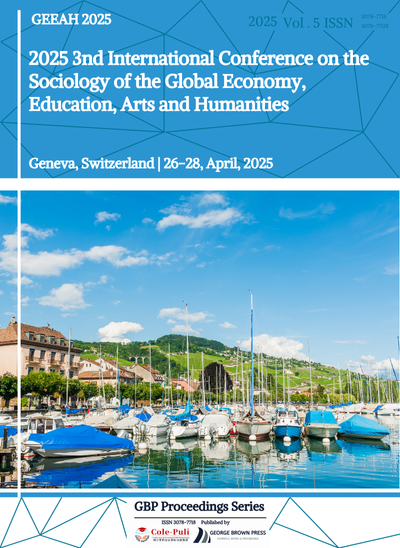Enhancing Resilience and Well-Being in Music Education Majors: Promoting Academic and Emotional Development
DOI:
https://doi.org/10.71222/hk44sa03Keywords:
positive psychology, psychological intervention, music education, mental health, PERMA modelAbstract
This study aims to investigate the effectiveness of enhancing resilience and well-being in music education majors through a positive psychology approach, with a focus on supporting their academic and emotional development. Initially, the research examines the significant role of music education in mental health, emphasizing ways to improve students' overall psychological well-being through measurable psychological variables. It further discusses theories related to positive psychology, utilizing the PERMA model (Pleasure, Engagement, Relationships, Meaning, Accomplishment) as a theoretical framework to illustrate the strong association between music education and students' psychological resilience. This study adopts a mixed-methods approach, combining quantitative and qualitative analyses in an intervention experiment conducted with a group of music education majors. The intervention was designed as a comprehensive psychological program, covering emotional regulation and social skills training. The evaluation of intervention outcomes indicates a notable improvement in participants' academic performance, a marked increase in well-being levels, and enhanced resilience, with a positive correlation identified between academic performance and psychological well-being. Further discussion delves into the mechanisms by which the intervention improved student well-being, proposing that music education is not only the transfer of skills but also a vital pathway to promoting psychological resilience. This study offers practical recommendations for the music education field, emphasizing the significant role of positive psychology in students' holistic development. It demonstrates that scientifically structured interventions can effectively enhance the psychological adaptability and subjective well-being of music education majors, thereby validating the mutually reinforcing relationship between music education and positive mental health.
References
1. P. Freire, Pedagogy of Freedom: Ethics, Democracy, and Civic Courage. Lanham, MD: Rowman & Littlefield, 1998. ISBN: 9781461640653.
2. M. E. Seligman, Flourish: A Visionary New Understanding of Happiness and Well-Being. New York, NY: Free Press, 2011. ISBN: 9781439190760.
3. J. Hattie and H. Timperley, “The power of feedback,” Rev. Educ. Res., vol. 77, no. 1, pp. 81–112, 2007, doi: 10.3102/003465430298487.
4. J. Davidson and B. S. McEwen, “Social influences on neuroplasticity: stress and interventions to promote well-being,” Nat. Neurosci., vol. 15, no. 5, pp. 689–695, 2012, doi: 10.1038/nn.3093.
5. M. Csikszentmihalyi and M. Csikzentmihaly, Flow: The Psychology of Optimal Experience. New York: Harper & Row, 1990. ISBN: 9780060920432.
6. M. E. Seligman, T. A. Steen, N. Park, and C. Peterson, “Positive psychology progress: empirical validation of interventions,” Am. Psychol., vol. 60, no. 5, p. 410, 2005, doi: 10.1037/0003-066X.60.5.410.
7. N. T. Gabana, “Gratitude in sport: Positive psychology for athletes and implications for mental health, well-being, and per-formance,” in Theoretical Approaches to Multi-Cultural Positive Psychological Interventions, Cham: Springer, 2019, pp. 345–370. ISBN: 9783030205829.
8. E. M. Skaalvik and S. Skaalvik, “Teacher self-efficacy and teacher burnout: A study of relations,” Teach. Teach. Educ., vol. 26, no. 4, pp. 1059–1069, 2010, doi: 10.1016/j.tate.2009.11.001.
9. S. De Leeuw, M. Greenwood, and N. Lindsay, “Troubling good intentions,” Settler Colonial Stud., vol. 3, no. 3–4, pp. 381–394, 2013, doi: 10.1080/2201473X.2013.810694.
10. J. Sun, “Exploring the impact of music education on the psychological and academic outcomes of students: mediating role of self-efficacy and self-esteem,” Front. Psychol., vol. 13, p. 841204, 2022, doi: 10.3389/fpsyg.2022.841204.
11. J. Váradi, “A review of the literature on the relationship of music education to the development of socio-emotional learning,” Sage Open, vol. 12, no. 1, p. 21582440211068501, 2022, doi: 10.1177/21582440211068501.
12. A. Majumdar, S. Kumar, and A. J. Bakshi, “The Hope Circuit: A Psychologist’s Journey from Helplessness to Optimism,” Br. J. Guid. Couns., vol. 47, no. 2, pp. 263–264, 2019, doi: 10.1080/03069885.2019.1612034.
13. J. Sloboda, “Emotion, functionality and the everyday experience of music: Where does music education fit?,” Music Educ. Res., vol. 3, no. 2, pp. 243–253, 2001, doi: 10.1080/14613800120089287.
14. W. Swann and D. C. Seyle, “The antecedents of self-esteem,” in Self-Esteem: Issues and Answers, pp. 201–206, Psychology Press, 2013. ISBN: 9780203759745.
15. K. R. Wentzel, “Social-motivational processes and interpersonal relationships: Implications for understanding motivation at school,” J. Educ. Psychol., vol. 91, no. 1, p. 76, 1999, doi: 10.1037/0022-0663.91.1.76.
16. D. Goleman, Emotional Intelligence: Why It Can Matter More Than IQ, Learn., vol. 24, no. 6, pp. 49–50, 1996. ISBN: 9780747526223.
17. R. F. Baumeister and M. R. Leary, “The need to belong: Desire for interpersonal attachments as a fundamental human moti-vation,” in Interpersonal Development, pp. 57–89, 2017. ISBN: 9781351153683.
18. A. Patston and L. Waters, “Positive instruction in music studios: Introducing a new model for teaching studio music in schools based upon positive psychology,” Psychol. Well-Being, vol. 5, pp. 1–10, 2015, doi: 10.1186/s13612-015-0036-9.
19. R. Chodkiewicz and C. Boyle, “Positive psychology school-based interventions: A reflection on current success and future directions,” Rev. Educ., vol. 5, no. 1, pp. 60–86, 2017, doi: 10.1002/rev3.3080.
20. R. Cremata and B. Powell, “Online music collaboration project: Digitally mediated, deterritorialized music education,” Int. J. Music Educ., vol. 35, no. 2, pp. 302–315, 2017, doi: 10.1177/0255761415620225.
21. J. A. Durlak, R. P. Weissberg, A. B. Dymnicki, R. D. Taylor, and K. B. Schellinger, “The impact of enhancing students’ social and emotional learning: A meta‐analysis of school‐based universal interventions,” Child Dev., vol. 82, no. 1, pp. 405–432, 2011, doi: 10.1111/j.1467-8624.2010.01564.x.
22. D. Litz and R. Blaik-Hourani, “Transformational leadership and change in education,” in Oxford Research Encyclopedia of Edu-cation, 2020, doi: 10.1093/acrefore/9780190264093.013.631.
23. N. Park, C. Peterson, and M. E. Seligman, “Character strengths in fifty-four nations and the fifty US states,” J. Posit. Psychol., vol. 1, no. 3, pp. 118–129, 2006, doi: 10.1080/17439760600619567.











